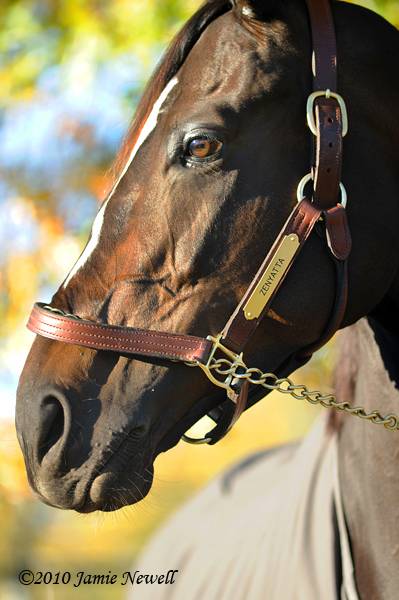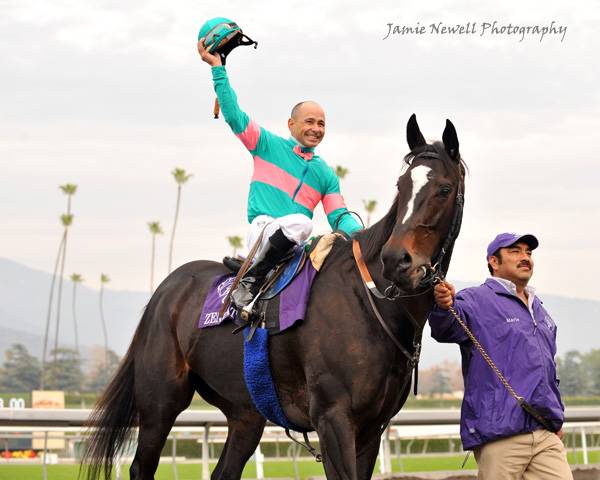Seconds after the field broke for the 2010 edition of the Breeders’ Cup Classic, track announcer Trevor Denman cried, “Zenyatta is dead last!” The grandstand erupted with an appreciative laugh. The whole stage was set for a show, after all, and most of the 72,739 people watching from the stands weren’t just your typical race-goers, they were fans of the starlet, Zenyatta. They knew her usual moves, her typical dramatic run as she always came from the back of the pack to sweep past rivals, giving them a performance to raise their voices to ear-splitting crescendos before snatching victory at the wire. It always seemed like she was saved from being buried near the back of the pack, as if carried on angel wings to win by some miracle of God; because doubtlessly, if there is a God, He, too, must be a Zenyatta fan.
But as Zenyatta found daylight off the final turn and started sailing over that hallowed stretch of ground toward the finish line, goosebumps racing down our arms with every great gobbling stride, we watched the birth of history as a stubborn horse by the name of Blame denied her that miracle. Make no mistake, Blame is not evil incarnate. Zenyatta simply met a freight train she could not run down this day. As they bobbed heads past the wire, Blame saw her and sped away from that behemoth, never knowing that great mare would put him in the history books alongside the names of Upset and Onion, the greatest spoilers of all-time. Zenyatta returned to be unsaddled to a standing ovation for her runner-up effort. Despite the jubilations of winning jockey, Garrett Gomez, Blame only received a smattering of cheers for his victory. Like an ending written by the Coen brothers, it wasn’t a finale like everyone expected, but it was a finale none would ever forget.
 The real tragedy of the 2010 edition of the Breeders’ Cup Classic wasn’t that Zenyatta lost, but the fact that a public that could’ve enjoyed the champion for two unbelievable years didn’t discover her until her last career race, which, as luck would have it, was the first time she was ever defeated. While a crowd of 72,739 fans packed the grandstands at historic Churchill Downs that Saturday, and millions more tuned in their TVs to watch the coverage on ESPN, the world stopped for three minutes to watch Zenyatta attempt to go out unbeaten with a record of 20-0. But that fairy tale ending just wasn’t meant to be.
The real tragedy of the 2010 edition of the Breeders’ Cup Classic wasn’t that Zenyatta lost, but the fact that a public that could’ve enjoyed the champion for two unbelievable years didn’t discover her until her last career race, which, as luck would have it, was the first time she was ever defeated. While a crowd of 72,739 fans packed the grandstands at historic Churchill Downs that Saturday, and millions more tuned in their TVs to watch the coverage on ESPN, the world stopped for three minutes to watch Zenyatta attempt to go out unbeaten with a record of 20-0. But that fairy tale ending just wasn’t meant to be.
Featured in W Magazine, Sports Illustrated, and Oprah’s O Magazine this fall as one of the top 20 most influential females in the world, the champion racemare was also given a spotlight on 60 Minutes the Sunday before the Breeders’ Cup. As it turns out, the public is, in fact, interested in horse racing. With a little renewed attention thanks to Disney’s film adaptation of the legendary Secretariat, Zenyatta was given every chance to be a star in the public eye. But this all came too late for a nationwide audience to truly appreciate her.
It’s not realistic to think that everyone who witnessed this year’s Breeders’ Cup is going to rush out to subscribe to TVG or HRTV on their dish, but had this all happened last year, when Zenyatta was going up against males for the first time, think of all the great performances people could’ve enjoyed. While all save one of her races in her 2010 campaign lacked the crescendo of a match-up versus males, perhaps the grandstands at Oaklawn, Santa Anita, Del Mar, and Hollywood Park would’ve been standing room only had all this press come before the curtain fell on Zenyatta’s career.
So much is said about what the horse racing industry is doing wrong. Horses retire too early to build a fan base; horse racing propaganda is limited to the people who already know about the sport and follow it religiously; too many big races are restricted to specialty cable stations; there are many complaints. What unfolded in the press in the days leading up to the Breeders’ Cup was a test of what the industry could do when it had every opportunity to seize the public’s interest. People discovered Zenyatta, and they loved her. Is it really a surprise? Here we have the most charismatic equine ever to step foot on a racetrack, a female, an undefeated champion, but the nation isn’t properly introduced to her until her final bow. It’s akin to discovering Paul Newman in Road to Perdition, his last big-screen role; what we see is a glimmer of greatness, but it’s too abrupt to get a taste of a performer who is surely respected as one of the greats of all-time. Think of the tragedy of never having seen the actor at his most dazzling in The Hustler, Hud, Cool Hand Luke, or Butch Cassidy and the Sundance Kid; this is the reality of Zenyatta’s legacy with the millions of viewers who tuned in to see her for the first time this past Saturday. They were built up about how great she was going into the 2010 Classic, and they witnessed a performance where the mare put her heart on the line, but they didn’t get the thrill or the satisfaction that we in the racing world have become accustomed to over the years: they’ll never understand the tears that come from seeing the explosive, against-all-odds, last-to-first kick that come as a result of knowing her.
 Zenyatta has done everything right. It’s the industry that let her and itself down. Before the 2009 Breeders’ Cup, racing had its shot to tell the world about our prized mare. Perhaps it doubted her too much. There were a lot of people out there who didn’t, after all, think she could beat males that first time. But this year, if all you knew came from Oprah, W, or 60 Minutes, you wouldn’t have thought that she could lose coming into the 2010 edition of the Classic. According to statistics, three times the amount of people than last year tuned in to watch Zenyatta go out undefeated at Churchill Downs. Is publicity only earned from a guarantee? Did any of the millions who may have watched Zenyatta for the first time take away how special this mare was, even in defeat?
Zenyatta has done everything right. It’s the industry that let her and itself down. Before the 2009 Breeders’ Cup, racing had its shot to tell the world about our prized mare. Perhaps it doubted her too much. There were a lot of people out there who didn’t, after all, think she could beat males that first time. But this year, if all you knew came from Oprah, W, or 60 Minutes, you wouldn’t have thought that she could lose coming into the 2010 edition of the Classic. According to statistics, three times the amount of people than last year tuned in to watch Zenyatta go out undefeated at Churchill Downs. Is publicity only earned from a guarantee? Did any of the millions who may have watched Zenyatta for the first time take away how special this mare was, even in defeat?
Now that Zenyatta has rounded her last field of rivals, has literally danced her last dance, what can the industry take away from the events that elevated Zenyatta’s status to world fame? Will it step up to the task of reaching out beyond its already-established fan base and try to bring in new faces? All the public needs is to be exposed to a good story and a good horse. Is that really too great of a task? If not for her record-setting streak of 19 straight wins, I hope that Zenyatta’s legacy will be to teach racing how to promote itself and the stars who make it all possible.
Zenyatta has given us the reins, now. What will we do with them?








